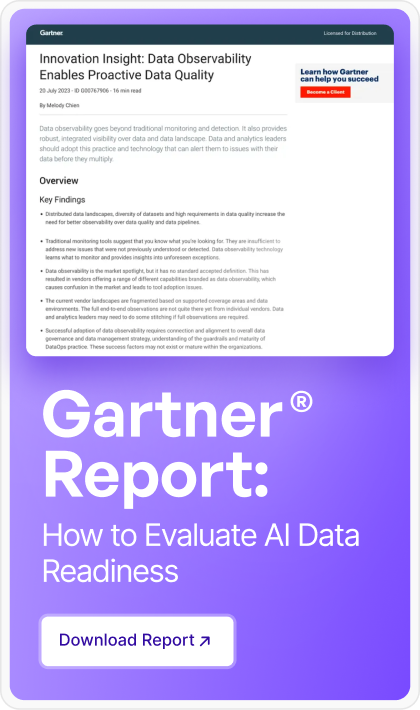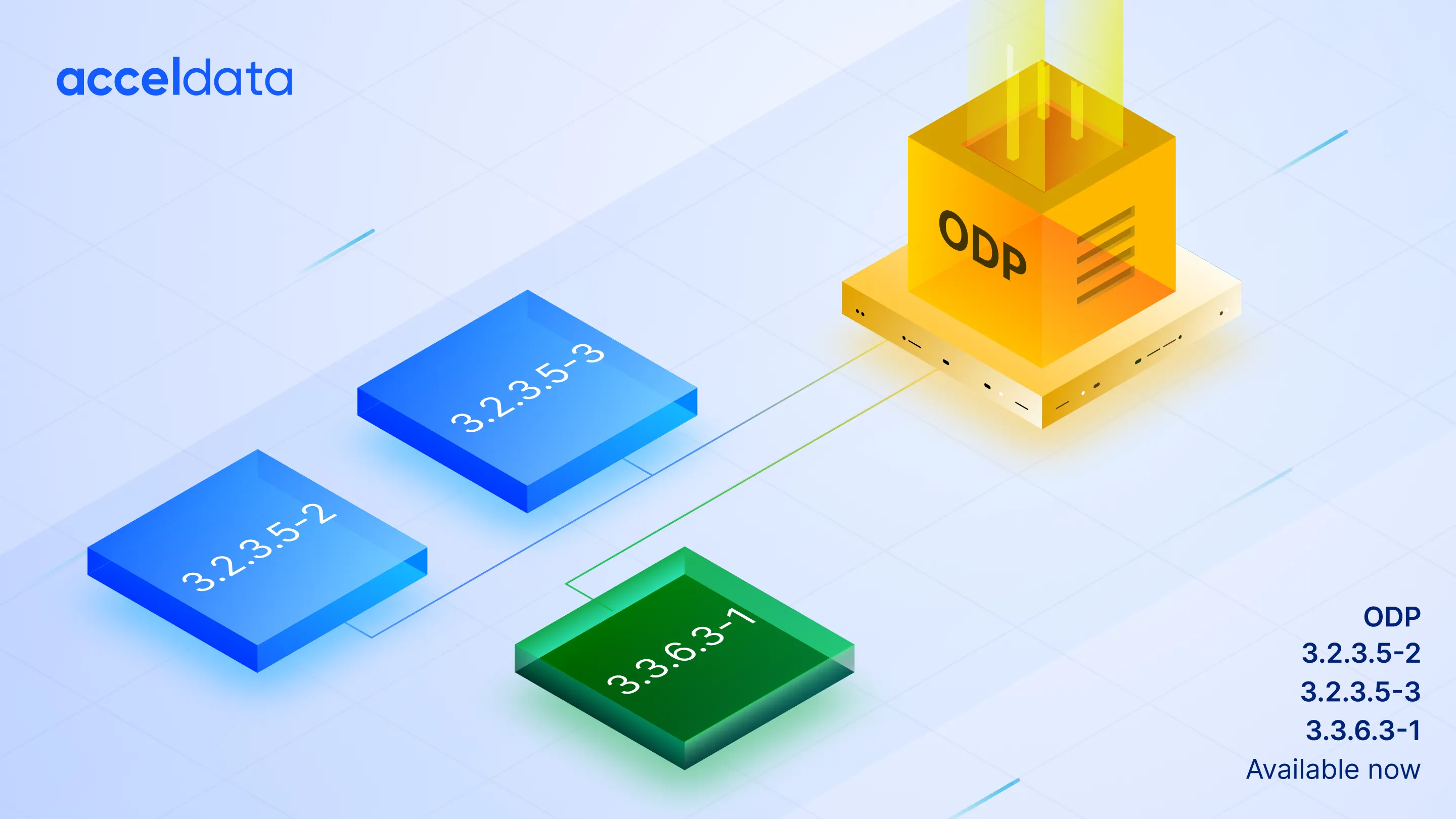Your organization is almost certainly sitting on massive amounts of data that comes from a growing array of sources. Some organizations scramble to make sense of it all while others are using their data observability platform to help develop innovative data products that create new revenue channels.
A data product is a product or service that is built using data, typically to provide insights or information to users. This can include things like data analytics platforms, data visualization tools, or even a simple spreadsheet or report that is used to make data-driven decisions. These are typically designed to be used by a specific group of users in a specific field, such as doctors, brokers/traders, and product designers, and they are typically built to solve a specific problem or address a specific use case.
Many ask, what is a data product, and it’s important to distinguish it from "data as a product," refers to the idea of selling or licensing raw or processed data to other organizations or individuals. In this context, the data itself is the product being sold, rather than a product built using the data. This can include things like selling access to a company's customer data, or licensing a dataset of historical weather data. Data as a product is typically sold to a wide range of customers, from other businesses to researchers and academics.
Data insights are at the root of how organizations build competitive data products. These insights provide a deep understanding of the data being collected that will be used for data product development. This understanding can be used to inform product design and development, and to identify areas for improvement and optimization. Developing and marketing effective data products is clearly becoming a critical factor in market competitiveness for companies in all industries.
These data insights can help data product teams understand customer behavior and preferences, which can be used to inform product features and design. Because data is continuously developed in these products, they can identify areas of low engagement or high churn, which can be addressed through targeted improvements or changes to the product
Additionally, data insights can also be used to inform business decision-making and strategy, by providing a data-driven understanding of the market and the company's performance. Data observability helps companies deliver the necessary data insights to help companies build better data products by providing the information and understanding needed to make informed and data-driven decisions, and to optimize and improve the products over time.
Examples of Data Products
Let’s look at some different types of data products. In these examples, you’ll see how data is being used to uncover new and different ways of engaging with data that organizations typically already have access to:
- Dashboards: A visual representation of data, often used for monitoring and analyzing performance metrics.
- Predictive Models: A mathematical model that uses historical data to make predictions about future events.
- Recommender Systems: A type of algorithm that suggests items or content to users based on their past behavior.
- Natural Language Processing (NLP) models: A type of model that can understand and respond to human language, used for tasks such as language translation, text summarization and sentiment analysis.
- Image and Video Recognition: A type of model that can identify objects, people, and activities in images and videos.
- Chatbots: A computer program that simulates a conversation with human users, often used for customer service or information retrieval.
Data Products for Specific Industries
Companies want to build data products for their specific industry because it can help them gain a competitive advantage. By leveraging data and advanced analytics that only they have access to (mostly because they are creating or orchestrating it), companies can gain insights into their customers, operations, and market trends that can inform decision-making and drive business growth.
Data products are helping enterprises change how they ideate, develop, and deliver (usually through continuous delivery, or DevOps-style product delivery) products because they enable organizations to do the following:
- Improve customer engagement and retention by providing personalized experiences
- Optimize operations by identifying inefficiencies and automating processes
- Develop new products and services by identifying unmet customer needs
- Identify new business opportunities by identifying trends in the market
- Reduce costs by identifying and mitigating risks
When enterprises are able to apply these methods, they make better use of their data and turn it into a valuable asset that drives business growth and improves decision-making.
Let’s look at different types of data products for some specific industries:
Data Products in Financial Services

Data products have given financial services organizations all types of benefits. With data products, banks, insurance companies, fintech companies, and other types of organizations can manage and mitigate risk to protect their assets and comply with regulations. Data products can help them identify and quantify risks, such as credit risk, market risk, and operational risk, by analyzing large amounts of data from various sources.
Financial services companies are also vulnerable to fraud, and data products can help them detect and prevent fraudulent activities by analyzing patterns in customer behavior, decisioning outcomes of identity verification processes, transaction data, and other sources.
Some examples of data products in the financial services industry might include:
- A software application that helps businesses visualize and analyze their sales data
- A website that provides real-time traffic information to help commuters plan their routes
- An online platform that connects customers with service providers, using data to match customers with the best service provider for their needs
- A mobile app that tracks users' fitness and health data and provides personalized workout and nutrition recommendations
- A machine learning model that predicts the likelihood of a customer churning based on their past behavior and other data points.
Data Products in Healthcare
Healthcare companies are in the business of helping people become, or remain, healthy. Doing that requires massive amounts of data to help deliver effective patient care and create innovative medical products.
The data used by healthcare enterprises comes from government, academic, and company research, as well as patient outcomes and other sources. When it is orchestrated with other relevant data, it can shed light on how to achieve potentially life-altering outcomes.
Data products help these healthcare enterprises identify patterns and trends in patient data, such as medical history, lab results, and treatment outcomes, which informs care decisions and improves patient outcomes. Additionally, healthcare companies can use this data to manage the health of populations to improve public health and reduce costs. Data products can help them identify and target high-risk populations, track and monitor disease outbreaks, and evaluate the effectiveness of public health interventions.
Now that so much healthcare is managed through Electronic Health Records (EHRs), healthcare companies need to manage and share patient data electronically. Data products can help them create and manage EHRs and make patient data more accessible and useful to healthcare providers, researchers, and patients.
These are just some examples of data products that are commonly used in the healthcare industry:
- An electronic health record (EHR) system that collects and stores patient data in a centralized, digital format
- A disease tracking and surveillance system that uses data to monitor and predict the spread of infectious diseases
- A predictive analytics platform that uses data to forecast demand for healthcare services and resources
- A personalized medicine platform that uses data and algorithms to match patients with the most effective treatments
- A telemedicine platform that enables patients to access healthcare services remotely, using data to connect them with healthcare providers.
Data Products in Telecommunications
Telecommunications companies want to develop data products both to improve their operations and infrastructure, and to improve their marketing and customer insights.
From an infrastructure standpoint, telecommunications companies are in continuous pursuit of optimizing their networks to ensure high quality of service and reduce costs. Data products can help them analyze network performance data, such as traffic, capacity, and coverage, to identify and resolve bottlenecks, improve network efficiency, and reduce costs.
But telecommunications companies also need to understand their customers in order to provide personalized services and improve customer engagement. Data products can help them gain insights into customer behavior, preferences, and needs by analyzing data from various sources such as call records, social media, and customer interactions. With these products, they can identify target segments, analyze customer behavior, and evaluate the effectiveness of marketing campaigns.
Additionally, telecommunications companies use data products to optimize IoT and 5G networks, maximize revenue and make better use of data to drive business growth and improve decision making. Here are some examples of data products that are commonly used in the telecommunications industry:
- A network management system that uses data to monitor and optimize the performance of a telecom network
- A customer service platform that uses data to improve the customer experience and provide personalized support
- A mobile app that tracks users' data usage and helps them manage their data plans
- A predictive analytics platform that uses data to forecast demand for telecom services and resources such as launch of the latest iphone or Android device
- A location-based marketing platform that uses data to target advertising and other content to users based on their location
Data Products in Retail
Whether it’s brick-and-mortar or digital – or a combination of both which is referred to as phygital – retail companies need data to anticipate trends, streamline supply chains, produce products, and deliver products efficiently to customers. Ultimately, retail companies want to develop data products for several reasons:

- Inventory Management: Retail companies need to manage their inventory to ensure they have the right products, in the right quantities, at the right time. Data products can help them analyze sales data, customer behavior, and market trends to optimize inventory levels and reduce waste.
- Personalization: Retail companies need to provide personalized experiences to customers to increase engagement and loyalty. Data products can help them gain insights into customer behavior, preferences, and needs by analyzing data from various sources such as purchase history, browsing behavior, and social media activity, and use that data to create personalized product recommendations and marketing campaigns.
- Fraud Detection: Retail companies are vulnerable to fraud, and data products can help them detect and prevent fraudulent activities by analyzing patterns in customer behavior, transaction data, and other sources.
- Marketing: Retail companies need to market their products and services to increase revenue and gain new customers. Data products can help them identify target segments, analyze customer behavior, and evaluate the effectiveness of marketing campaigns.
- Supply Chain Management: Retail companies need to manage the flow of goods from suppliers to customers, and data products can help in tracking inventory, tracking delivery, identifying bottlenecks, and optimizing the supply chain to reduce costs and increase efficiency.
- Price Optimization: Retail companies need to ensure that they are pricing their products competitively and maximizing revenue, data products can help in analyzing customer behavior, market trends, and competitor prices to optimize pricing strategies.
These use cases are reflected in some of the types of data products that are commonly used in the retail industry:
- A customer relationship management (CRM) system that uses data to track and manage customer interactions and preferences
- An inventory management system that uses data to optimize inventory levels and prevent stockouts
- A predictive analytics platform that uses data to forecast demand for retail products and services
- A personalization platform that uses data to provide personalized recommendations and offers to customers
- A supply chain management system that uses data to improve the efficiency and transparency of the retail supply chain.
To learn how to improve data product development, get a demo of Acceldata’s data observability platform.
Photo credits:
Photo by Tech Daily on Unsplash
Photo by National Cancer Institute on Unsplash
Photo by Cova Software on Unsplash
Photo by Shahadat Rahman on Unsplash






.png)



.png)






.webp)
.webp)


